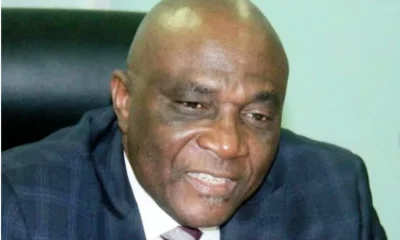News
Agric experts say Tinubu’s broadcast raises hope, requires proper

Some agricultural experts say President Bola Tinubu national broadcast is full of hope and many fruitful expectations but requires proper implementation.
They charged the President to set up mechanisms for proper planning and smooth implementation of his administration’s agricultural policies.
The experts disclosed this in separate interviews with the News Agency of Nigeria (NAN) on Tuesday while reacting to the President’s national broadcast.
Prof. Ayo Olalusi, Department of Agricultural and Environmental Engineering, Federal University of Technology Akure, said the president broadcast, particularly his plan on agriculture, was a welcome development.
Olalusi said the implementation of the food security plan should be strictly supervised and monitored by the presidency.
“It is full of hope and many fruitful expectations.
“However, it should be noted that this is not the first time the nation will be listening a well-articulated speech and good proposals from our leaders.
“Most of the time, the implementation is usually the major challenge,”Olalusi said.
He said the implementation of the state of emergency declared on food production should be strictly supervised and monitored by the presidency.
Olalusi stressed that the implementation should not be hijacked by the political parties.
“Another challenge that hinders implementation is the problem of the ‘deceptive data base ‘ of farmers.
“The presidency should find a way of purging those who are not true farmers from the data base being paraded by the Ministry of Agriculture.
“Most of the time, the inputs go to the hand of those who will resell it to the farmers at high cost.
“The government should map out innovative ways of reaching the real farmers without passing through the middle men,” he said.
On his own part, Prof. Femi Ajayi, Faculty of Agriculture, Department of Agricultural Extension, Obafemi Awolowo University, Ile-Ife, urged the president not to make the food security plan another white elephant project.
Ajayi who doubted the workability of all the president’s proposal said there were many questions begging for answers in the broadcast.
He called on the government to work with committed people that would think through the process to make the proposals achievable.
Ajayi urged the Federal Government to desist from dealing with political associations or farmers in order not to truncate the process.
“Honestly, we need eggheads that will be able to think through with the government and make these proposals achievable.
“I am only saying as a professor of agriculture how are all these proposals workable?
“In agriculture, there’s something we call planning, implementation and evaluation. The president’s plan is suppose to go in that circle but does not appear so.
“We want to bring down the price of food but it is not only grain that we consume in Nigeria, government need to focus on all agricultural produce, grains, tubers , vegetables, fruits and others.
“Don’t focus only on rice, maize and wheat.
“How will the grains be distributed among the 36 states and FCT? Are we sure the process will not be hijacked by political or party faithful?
“There are many questions that are begging answers.
“If we solve our immediate problems what will happen in the long run. The strategy will not address the present food security confronting the nation because many people will hoard it.
“The distribution of grains may not amount to food on the table of average Nigerians,” he said.
Ajayi said the president broadcast had not really changed the situation on ground.
He the government need to give all these strategies a thought and see how they are going to lay it out and bring out a very strong strategic planning and break it down to cycles.
“Let me say that I don’t know of anybody that is jubilating over the broadcast, everything is like putting or postponing something.
“Don’t let it be another type of talk to hail agriculture because of the problem we have at hand.
“Where is the land to cultivate all these crops? Have they acquired the land? Have they allocated the land to people that will manage them? Or is it going to be another white elephant project?, Ajayi asked.
He urged the government to work with universities of agriculture and research institutes to find lasting solutions to mirage of problem confronting the nation’s food security.
“We have universities of agriculture, but it is as if they are not useful. We have faculty of agriculture and colleges of agriculture but it is as if they are not useful.
“Poultry farmers are crying and government has not been able to find a lasting solution to the sector.
“We cannot do it at a shot like this, the government is just two months old in office.
“By so doing, maybe we will get some where.
He urged the Federal Government to address the nation’s food security, make farms safe and attract young people to agriculture.
“I believe that the government can still do better with time,” he said.
News
Woman killed while crossing road in Anambra

The Federal Road Safety Corps (FRSC), Anambra State Sector Command, has confirmed the death of a woman in an accident at Okpoko Market on the Asaba-Onitsha Road.
The Sector Commander, Mr Adeoye Irelewuyi, who confirmed the accident to journalists in Awka on Thursday, said that the woman was hit while she was crossing the road.
He said that the accident, which occurred on Wednesday, involved a commercial tow truck with registration number XA550BMA.
“Eyewitness report reaching us indicates that the truck was towing a vehicle in an uncontrollable speed along the axis.
“The vehicle that was being towed got detached from the tow truck.
“It hit and killed a female adult, who was said to be crossing the road, while the tow truck continued its movement.
“FRSC rescue team came to the scene and took the woman to Toronto Hospital, Onitsha, where she was confirmed dead and her body deposited at the hospital’s mortuary,” he said.
While sympathising with the family of the dead, the sector commander urged motorists, especially tow truck drivers, to exercise a high level of professionalism.
He also urged the drivers to always use standard equipment and avoid speeding.
News
LASG’s maize palliative impactful, says poultry association chair

The Chairman, Poultry Association of Nigeria (PAN), Lagos State Chapter, Mr Mojeed Iyiola, said the state government’s maize palliative to members of the association made a positive impact on the sector.
Iyiola said this in an interview with the News Agency of Nigeria (NAN) on Thursday in Lagos.
“We received about 150,000 tons of maize in February from the Lagos State government as palliative to cushion the effect of high feed prices.
“The major benefit of the palliative is that it actually cushioned the cost of production for most poultry farmers in the state.
“The palliative was beneficial as it made the cost of some poultry produce, especially eggs to drop,” Iyiola said.
He noted that prior to the palliative, a crate of egg was sold between N3,500 and N3,700 at the farm gate, but after the palliative, it now sells between N3,200 and N3,400.
According to the PAN chair, retailers and middlemen who sell from N3,800 to N4,200 do that for their personal gain.
“We have urged our members to sell their eggs at reasonable prices following the receipt of the palliative from the government.
“We appreciate the Lagos State government for the palliative but we also urge the federal government to do likewise, to further reduce the cost of production in the sector.
“This will consequently lead to drop in the prices of all poultry produce across board,” he said.
He said the palliative was shared among financial members of the association at no extra cost.
“As an association we shared the grains equally across PAN’s eight zones in the state equally. We also mandated each zone not the sell even a grain of the maize.
“We, however, considered new poultry farmers who wanted to the join the association as beneficiaries of the palliative,” said Iyiola.
He noted that through the palliative, more poultry farmers were recruited into the association.
“The maize was shared only to poultry farmers and not feed millers, it is the major component of poultry feed formulation,” he said.






















